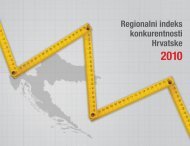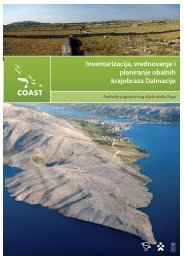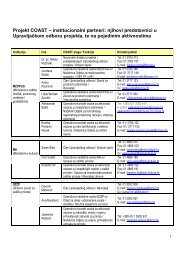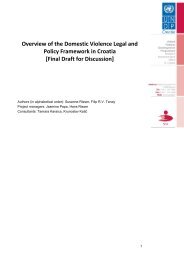WEB engleska verzija end.indd - UNDP Croatia
WEB engleska verzija end.indd - UNDP Croatia
WEB engleska verzija end.indd - UNDP Croatia
- No tags were found...
Create successful ePaper yourself
Turn your PDF publications into a flip-book with our unique Google optimized e-Paper software.
THE SOCIALLY EXCLUDEDCHAPTER 3these individuals, but the legal guardian is appointedand supervised by the Centre for Social Welfare. Mostfrequently, individuals with disabilities are completelydeprived of their legal capacity which may have negativeeconomic effects (financial rights). Deprivationof legal capacity should be an exception, evaluatedon a case-by-case basis and in accordance with theindividual needs of each person. The work of the legalguardians should be supervised by the court or byan external monitoring body, not by a body vestedwith public powers which simultaneously fulfils therole of a guardian/advocate. In all other cases, peoplewith intellectual disabilities should have the right toprofessional counsel that provides support in makingdecisions and exercising their right of choice.Granting the people with disabilities the legal capacity,would allow them to voice their life decisions,such as the choice of residence and place of work.Encouraging the development of community-basedprofessional support services is a necessary preconditionfor the deinstitutionalization of people withintellectual disabilities.3.4.10 Policy ImplicationsThe State focuses special attention on the protectionof individuals with disabilities and provides financialassistance for the basic cost of living. This assistance,however, should not be geared towards institutionsor caregivers, but towards individuals, enabling themto purchase the services they require.Two types of additional agencies should be established- an agency for specialised foster family care andan agency for supported employment. The agency forspecialised foster family care would encourage andmonitor foster care for children while discouraginginstitutionalisation. The agency for supported employmentshould facilitate the employment of peoplewith disabilities in the labour market, providing themwith the necessary support at the workplace. Employmentof people with disabilities reduces the costs ofsocial welfare, allowing the system to focus on thedevelopment of quality community-based services.Consistent implementation of the existing legislationrelated to the education of people with intellectualdisabilities would enable them to take an active partin the labour market.3.5 People with Physical DisabilitiesBox 6: A life storyM.C. lives with his father in a village. Six monthsago, his mother died. His posture is distorted, andwhen he sees the physically disabled on TV, he feelscompletely uncomfortable. When he sees otherslooking at him, his posture worsens. For him, andespecially for his father, this is very embarrassing, sowhenever he notices somebody unfamiliar comingtowards their house, his father takes him insideand hides him from views. M.C. also has majorspeech defects, so it is very difficult for him, if notimpossible, to communicate with people orally. Hisfather does the best in supporting M.C., but he israther ill himself and cannot rise to this challengingsituation. They have tried to find a person to lookafter them through the classifieds, but have beenunsuccessful. Institutionalisation in his view wouldbe the worst solution. According to M.C., their socialposition is as low as it can get. The only financialassistance he receives is 300 HRK from his uncles.M.C. is 54 years old and did not receive any formaleducation. He is self-taught, but very successful incertain skills like the English language, using thecomputer, and playing chess on US Chess-Live,where he became a member. M.C. also designscal<strong>end</strong>ars, but has no colour printer, so he only makescopies for his neighbours. He loves to listen to popand rock music. The harsh reality has encouragedhim to use his computer and to ask questions andinquire about membership in associations or aboutplaces where he might get free legal counsel.After contacting M.C., it was discovered that nosocial worker has come to assess his situation,although they claim that they do know of him.In order to carry out the assessment, the socialworkers require a written request, which they claimnot receiving, although one has been sent. The localassociation for people with disabilities has neverheard of M.C. After several interventions, the Centrefor Social Welfare has finally visited him, uponwhich M.C. started receiving a personal disabilitypension. As the solution to his permanent care, M.C.opted for institutionalisation because, accordingto the opinion of his social workers, this was thebest choice for him and the easiest choice for socialservices.65

















